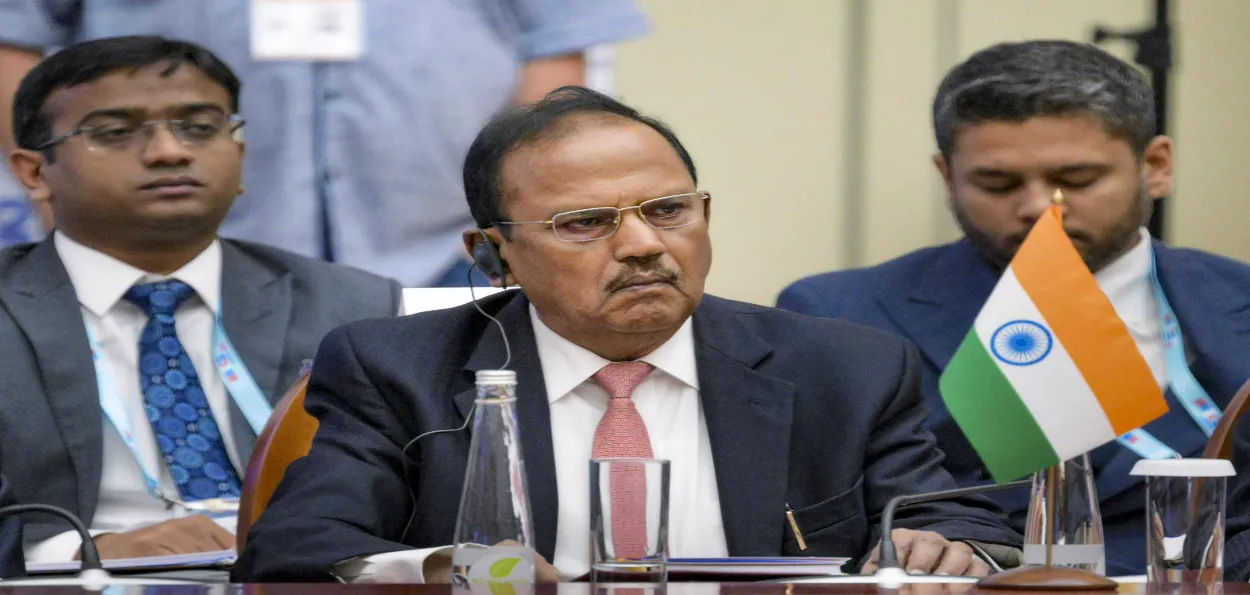
Vidushi Gaur/ New Delhi
In the aftermath of India's Operation Sindoor on May 7, 2025, National Security Advisor (NSA) Ajit Doval engaged in high-level discussions with his counterparts from several countries, including the United States, United Kingdom, Saudi Arabia, United Arab Emirates, Japan, Russia, China, and France. The operation, a targeted strike on nine locations in Pakistan and Pakistan-administered Kashmir, was a direct response to the April 22 Pahalgam attack that resulted in the deaths of 26 civilians.
NSA Doval initiated contact with key international leaders to brief them on the actions taken by India. He emphasised that the strikes were "measured, non-escalatory, and restrained," aimed solely at dismantling terrorist infrastructure linked to groups such as Lashkar-e-Taiba and Jaish-e-Mohammed. Doval assured his counterparts that India had no intention to escalate the situation but was prepared to respond decisively should Pakistan choose to intensify hostilities.
Among the leaders Doval spoke with were U.S. National Security Advisor Marco Rubio and Secretary of State Antony Blinken. In the United Kingdom, NSA Jonathan Powell was briefed, while in Saudi Arabia, NSA Musaid Al Aiban and UAE NSA H.H. Sheikh Tahnoon were also contacted. Japan's NSA Masataka Okano received a briefing, as did Russian NSA Sergei Shoigu and China's Foreign Minister Wang Yi. Additionally, Emmanuel Bonne, Diplomatic Advisor to the French President, was informed of India's actions.
These diplomatic engagements underscored India's commitment to transparency and its intent to maintain open channels of communication with the international community during a period of heightened tension.
The global community has closely monitored the developments following Operation Sindoor. The United Nations Secretary-General António Guterres called for maximum restraint from both India and Pakistan, emphasizing the need to avoid further escalation. Similarly, former U.S. President Donald Trump expressed concern over the strikes, labelling them as "a shame" and hoping for a swift de-escalation. China's Foreign Ministry spokesperson expressed regret over India's military operation and urged both sides to act in the larger interest of peace and stability, calling for calm and restraint. In the Middle East, UAE Foreign Minister Abdullah bin Zayed Al Nahyan echoed these sentiments, urging both nations to show restraint and avoid military escalation.
NSA Doval has indicated that he will continue to engage with his international counterparts in the coming days to ensure that India’s position is clearly communicated and to work towards de-escalating tensions in the region. These ongoing diplomatic efforts are aimed at maintaining stability and preventing further conflict between the two nuclear-armed neighbours.
Operation Sindoor represents a significant moment in India's approach to counterterrorism, demonstrating a willingness to take decisive action against threats while simultaneously engaging in diplomatic efforts to manage international relations. As the situation continues to evolve, India's commitment to transparency and dialogue remains a cornerstone of its strategy to address security concerns and maintain regional stability.
At a joint briefing on Operation Sindoor in which nine terrorist camps were targeted with precision strikes, Foreign Secretay Vikram Misri said the terror attack in Pahalgam was marked with extreme barbarity, with the victims mostly killed with head shots at close range and in front of their family.
"The family members were deliberately traumatised through the manner of killing, accompanied by the exhortation that they should take back the message. The attack was clearly driven by the objective of undermining normalcy returning to Kashmir," he said.
Misri said that Indian intelligence agencies had been monitoring terrorist activities and raised concerns regarding more terrorist attacks in India.
"Our intelligence indicated that further attacks against India are impending. Thus, compulsion, both to deter and prevent and hence earlier this morning, India exercised its right to respond to deter such more cross-border terrorism... Our actions were measured and non-escalatory, proportionate and responsible. They focused on dismantling terrorists' infrastructure," he said.
Wing Commander Vyomika Singh informed that a total of nine terror sites were targeted and successfully destroyed. She asserted that the locations were selected so that there was no damage to civilians and their infrastructures.
"Operation Sindoor was launched by the Indian Armed Forces to deliver justice to the victims of the Pahalgam terror attack and their families. Nine terrorist camps were targeted and successfully destroyed... The locations were so selected to avoid damage to civilian infrastructures and loss of any civilian lives, she said.
READ MORE: Op Sindoor: Briefing led by Col. Sophia Qureshi and IAF Wing Commander Vyomika Singh
Col Sofiya Qureshi showed some videos of the strikes destroying terror camps.
